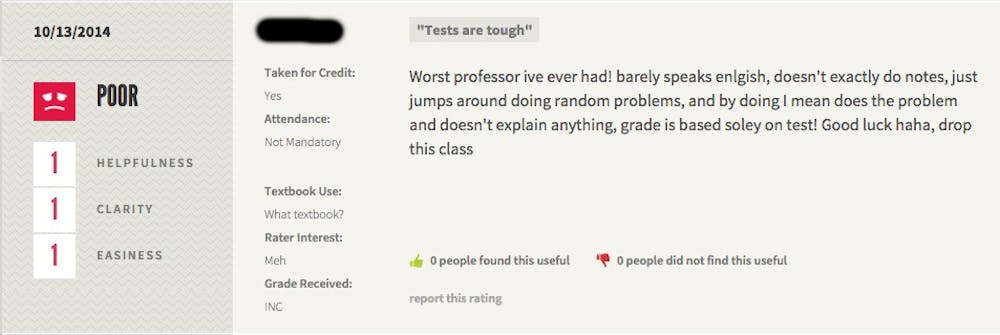Students, professors struggle with communication issues
Eugene Roh is still haunted by a single comment made in a business course he was teaching.
Because of his South Korean accent, a frustrated student told him to learn English before attempting to teach the class. Comments like these are not exclusive to a single professor or incident — similar comments can be found on faculty reviewing websites like Rate My Professors, where students complain of “broken English,” “heavy accents” and “communication barriers.”
“When I read that kind of comment, it’s just heartbreaking,” Roh said. “Because that basically means, ‘you are not qualified to teach,’ number one. Number two, ‘you don’t belong here.’ It’s a sense of exclusion.”
Before becoming a professor he tried to work in the hotel industry, but had a hard time being hired despite interviewing well. He didn’t understand why until his mentor explained Roh couldn’t work in the hotel industry because of his accent.
Later, Roh talked to a linguistics professor and discovered because he came to the United States when he was 25 years old, he would have his accent forever.
To him, destructive comments won’t improve anything; communication is the solution.
“(Students and professors) should not speak to each other; they should communicate with each other so that they may not be misunderstood," Roh said. "This communication could have a number of different forms; it could be visual, it could be written, it could be verbal."
He said this idea applies to all professors, not just professors with “heavy accents.” Roh said some professors truly can be difficult to understand, but at the same time, some academic concepts are challenging and students could struggle to understand regardless of who teaches the class.
Haslett sophomore Emily Tinney said when students and professors make an effort, communication is simple. She hasn’t had a problem understanding any of her professors.
“I know any professor I’ve had that’s had more of a stronger accent has been open about it," Tinney said." They’ll say something about it on the first day of class and say, ‘if you can’t understand me, just let me know’ and they’re really good about it."
Vicksburg sophomore Tina Bednarz said students should try to see the situation from the professor’s perspective.
“It’s just like if you were a professor in Germany or Croatia, well, your accent’s not going to be great either, and it’s a very difficult barrier," Bednarz said.
Pulaski freshman Marlee Reiniche said some of the students who make complaints are not putting in much effort anyway.
“I feel like some of them are probably just saying that because they’re not paying attention,” Reiniche said. “It’s because of the accent, when in all reality, they’re just not paying attention and if they were paying attention, they’d probably understand.”
Some professors can be difficult to understand, but at the same time, some academic concepts are challenging and students could struggle to understand regardless of who teaches the class, Roh said.
“It’s really just the teacher and whether they’re able to present that information well. It doesn’t matter where they’re from so long as they’re a good professor," Bednarz said.
Roh said students can ask professors to write something down, they can ask for clarification, and they can ask the professor to speak slower.
“If you ask me to wear a pink skirt every time I come to class, I would love to do so; I could even wear the matching shoes. But I can’t change the way I speak,” Roh said.




